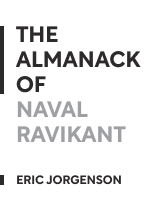

This article is an excerpt from the Shortform book guide to "The Almanack of Naval Ravikant" by Eric Jorgenson. Shortform has the world's best summaries and analyses of books you should be reading.
Like this article? Sign up for a free trial here .
Why does Naval Ravikant prioritize physical health above everything else? What type of exercise does he recommend?
Naval Ravikant strives to take care of his body, and he shares his own habits as recommendations for others. His preferences include a particular diet, a certain way of exercising, consideration for the immune system, and moderation or abstinence when it comes to things such as sugar and alcohol. He also explains why he puts a priority on physical health.
Read more to learn Ravikant’s tips for how to care for your body.
Caring for Your Body
Your experience of the world is mediated by your physical health, according to Ravikant. This is one of the reasons he’s chosen to prioritize his own physical health above all other things. If his body isn’t functioning well, his mind won’t be able to function well, and he’ll have a harder time dealing with life circumstances. He suggests incorporating the following habits into your own life as he addresses how to care for your body.
(Shortform note: Researchers find that the connection between the health of your body and the health of your mind works both ways: As Ravikant suggests, poor physical health is a risk factor for poor mental health, but poor mental health is also a risk factor for developing chronic diseases and infirmities.)
1. Eat well. Ravikant suggests the paleo diet, which consists of foods that our hunter-gatherer ancestors theoretically had access to, such as grass-fed meat, nuts, and fresh fruit—essentially, nothing processed or refined and no grains, legumes, or dairy.
(Shortform note: The paleo diet is popular, but it may not be as healthy as Ravikant implies. For example, researchers have found that people who follow a paleo diet have higher levels of a chemical compound linked to cardiovascular disease as well as an increased risk of developing cancer and diabetes.)
2. Exercise. Instead of being based around gym equipment, Ravikant believes your exercise should come from play. Consider playing team or individual sports. Whatever you do, it should be something you’re happy to do daily.
(Shortform note: Ravikant’s advice to exercise through play echoes the advice of healthcare professionals: Experts suggest that enjoyment is one of the key factors that determines how well you stick to an exercise habit. If you have fun doing it, you’re more likely to exercise consistently. This may involve trying out different activities to find something that sparks your interest.)
3. Condition your immune system. Ravikant believes that you need to be exposed to allergens and pathogens to build your immune system. If your environment is too sterile, you won’t be very immune.
(Shortform note: Many health experts agree with this point. They note that exposure to a diverse array of environmental microbes correlates to fewer instances of inflammatory disorders such as allergies and autoimmune conditions. However, the evidence suggests that these benefits are mainly conferred during childhood.)
4. Say no. We evolved, says Ravikant, for scarcity—resources were hard to come by. In our modern world of abundance, we have a hard time saying no to all the things we can easily have. Accordingly, we have too much sugar, too much alcohol, too many drugs, and so on. Ravikant believes you need to practice saying no to these things.
(Shortform note: Researchers in the field of neuroscience believe that the human brain evolved mechanisms that cause us to value short-term benefits over long-term benefits. The implications of this are, as Ravikant implies, that it’s harder for us to delay gratification even when we know it’s beneficial to do so.)

———End of Preview———
Like what you just read? Read the rest of the world's best book summary and analysis of Eric Jorgenson's "The Almanack of Naval Ravikant" at Shortform .
Here's what you'll find in our full The Almanack of Naval Ravikant summary :
- Millionaire Naval Ravikant's advice on how to build wealth and happiness
- The three types of leverage you'll need to become successful
- The habits to adopt that will lead to happiness






